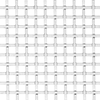Filter by
Material
For Use With
Thickness
Length
Flexibility
Diameter
Clarity
Performance
Hardness Rating
Maximum Temperature
Application
Environment
ID
Food Industry Standard
Export Control Classification Number (ECCN)
DFARS Specialty Metals
Raw Materials
Fluid Handling
Measuring and Inspecting
Fastening and Joining
Fabricating and Machining








































